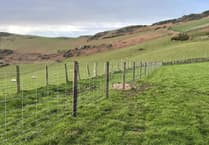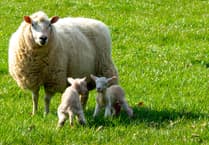A new report released this week warns that Wales will experience drier summers, warmer and wetter winters and more unpredictable weather patterns, with farmers, who are on the frontline of climate change, feeling the impacts in their pockets. An overwhelming majority of farmers interviewed for the study confirmed their experience of a changing climate. The report concludes extreme weather events caused by climate change are likely to become the norm and drive escalating costs, posing a significant risk to future food production in Wales.
‘Extreme weather and its impact on farming viability in Wales’ an independent report by Farmlytics, commissioned by WWF Cymru, reveals that climate change is already having a dramatic negative financial impact on Welsh farming. But evidence from farms across Wales shows that nature-friendly regenerative farming practices makes farms more resilient to extreme weather caused by climate change.
For the past five years Wales has experienced several extreme weather events from severe storms and flooding to heavy snowfall and summer droughts. Last year, Wales saw one of the driest periods on record followed by the third-wettest July in over 100 years. This is affecting farms in several ways, including through restricted growth of grass to feed animals, restricted crop growth, livestock deaths due to cold weather or extreme heat, water shortages and storm damage to agricultural infrastructure.
Farmers interviewed for the report reveal how adopting measures such as increased tree cover help protect livestock from both heat stress, and cold weather. Activities include improving soil health through rotational grazing for example to enable better water retention during drought, greater crop diversity and improvement of on-farm water management in terms of irrigation, including rainwater harvesting and water storage reservoirs.
Welsh farmers are at the frontline of climate change and are facing challenges to adapt and invest in climate-resilient systems. The report outlines how support from both Welsh government and the private sector will be critical in ensuring the transition to climate and nature-friendly farming supports resilient businesses and thriving rural communities.
WWF Cymru’s Shea Buckland-Jones, Head of policy and advocacy explains: “Climate change is putting huge pressure on Welsh farmers and rural communities and this impact will only intensify as weather becomes more extreme. The evidence clearly shows that farmers which adopt nature friendly regenerative practices which enhance land resilience, and enable them to better mitigate and adapt to droughts and floods are those best equipped to weather the storm of climate change. Whilst nature friendly regenerative practices may not eliminate the impact of adverse weather, they can enhance a farm’s ability to cope with changing conditions.”.
“It is critical that farmers are supported to implement nature-friendly practices needed to drive the transition to a more sustainable and resilient farming system. Welsh Government must provide support and funding via the Sustainable Farming Scheme to enable farmers to access measures for climate mitigation and adaptation. Payments for nature-friendly farming must be backed up by investment in jobs, training, and skills so that farmers are first in line to prosper from this transition.”
Climate change poses huge risks to food security. The evidence in this new report backs up the UK’s first Food Security Report in 2021(1) which concluded the biggest medium to long term risk to the UK’s domestic production comes from climate change and other environmental pressures. Extreme weather has a negative effect on livestock and therefore food produced. Another key area of concern is the fruit and vegetable sector, with imports largely sourced from climate-impacted parts of the world. More diverse farming systems with mixed rotations could help lessen reliance on imports and exposure to climatic impacts on the supply of fruit and vegetables.




